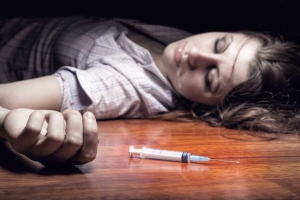A heroin overdose is the alarming wake-up call that sets heroin users on the path to recovery. Depressed breathing, disorientation, weakened pulse, and loss of consciousness are key symptoms of a heroin overdose. However, even after experiencing something as terrifying as a heroin overdose, the prospect of heroin withdrawal can is scarier for some people. Withdrawal symptoms are the largest hurdle heroin users face on the path to recovery, and many will not be able to overcome the challenge alone. Understanding the withdrawal symptoms is the first step to overcoming fear and moving forward on the path to sobriety.
What Happens During Heroin Withdrawal?
 Whether through an active choice to detox or a sudden inability to acquire the substance, the symptoms of heroin withdrawal will typically appear in users within 24 – 48 hours. These symptoms likely follow heroin overdose symptoms as a users drug abuse worsens. Users will experience a variety of physical and psychological symptoms that vary in severity depending on the frequency and duration of the user’s heroin use.
Whether through an active choice to detox or a sudden inability to acquire the substance, the symptoms of heroin withdrawal will typically appear in users within 24 – 48 hours. These symptoms likely follow heroin overdose symptoms as a users drug abuse worsens. Users will experience a variety of physical and psychological symptoms that vary in severity depending on the frequency and duration of the user’s heroin use.
Physical Symptoms
Physically, users will experience symptoms similar to a severe case of the flu:
- Disorientation
- Insomnia
- Nausea
- Vomiting
- Respiratory issues
- Muscle and joint pain
- Cold flashes
Unlike the flu, using heroin again will alleviate these withdrawal symptoms. The psychological weight this knowledge causes the user is what makes overcoming heroin withdrawal so difficult.
Psychological Symptoms
Along with the temptation of usage as a form of relief from physical symptoms, there are psychological symptoms during withdrawal. Users may experience symptoms such as:
- Anxiety
- Irritability
- Hallucinations
- Restlessness
Along with these symptoms, other underlying mental disorders may surface as well.
Approaching the Detox
Due to the stress of detox and the risk for relapse, self-detox is dangerous and not recommended. If a user relapses after a self-detox, they’re usually unable to handle life-threatening situations and run the risk of experiencing a heroin overdose.
Instead of self-detoxing, users can reach out to a health professional or licensed facility and have a medically monitored detox. The process comprises of 24-hour supervision that lasts anywhere between five and seven days depending on the severity of the addiction. During the process, professionals may administer remedies to alleviate withdrawal symptoms. But recovery doesn’t end after a successful detox. Detox is simply the first step on the road to recovery.
Preventing Relapse and Heroin Overdose
According to a Johns Hopkins’ study, approximately 65-80% of patients relapse after detox and run the risk of heroin overdose. This is mostly because users do not seek additional care after their detox. Additional care from a licensed heroin addiction treatment facility and clinical staff will monitor health, nutrition, and stability, and help the user readjust to life outside of addiction. These facilities play a key role not only in preventing heroin overdose and facilitating a successful detox, but also in helping rehabilitate patients to lead successful, fulfilling, and healthy lives.



